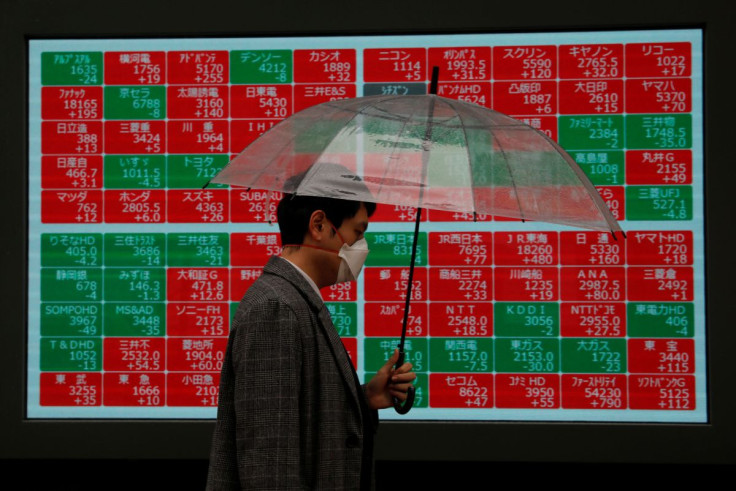Stocks Dive On Surging Inflation, Ukraine Risks; China Markets Slump

Asian shares extended a global slump on Friday after the fastest U.S. inflation in four decades bolstered expectations for more aggressive rate hikes, and as Chinese equity markets slumped over regulatory concerns of U.S.-listed mainland firms.
Sentiment also suffered on worries over Russia's war against Ukraine, after talks between their foreign ministers on Thursday brought little respite in the conflict between the two countries.
"We've got a terrible macro backdrop (with) a serious inflation problem implying that we're going to see much, much tighter monetary policy," said Rob Carnell, chief economist at ING in Singapore.
Russia's war against Ukraine was likely to make everything from energy and metals to agricultural goods a lot more expensive, Carnell added.
"Everybody's incomes are going to get eroded. Global growth is going to get battered. What more do you need?
"At some stage you probably will pull back much more sharply, but at the moment there's still a bit of denial going on in markets."
The United States, together with the Group of Seven nations and the European Union, will move on Friday to revoke Russia's "most favored nation" status over its invasion of Ukraine, multiple people familiar with the situation told Reuters.
Stripping Russia of its favored nation status paves the way for the United States and its allies to impose tariffs on a wide range of Russian goods, which would further ratchet up pressure on an economy that is already heading into a "deep recession."
By mid-afternoon, MSCI's broadest index of Asia-Pacific shares outside Japan had skidded 2.0%, after a retreat on Wall Street spilled over on many of the region's country benchmarks, which turned deeply red.
Sellers swarmed Hong Kong's equity market after U.S.-listed Chinese stocks tumbled following the naming of the first Chinese firms to be potentially de-listed in the United States.
The Hang Seng index slumped 3.7%, with the shares of Yum China and four other firms taking a beating after the companies were embroiled in an auditing dispute between Beijing and Washington.
The sell-off in Chinese shares came even as the country's securities regulator said on Friday it was confident it will reach an agreement with U.S. counterparts on securities supervision.
Outside Hong Kong, the losses in Chinese shares were smaller, with the country's blue-chip index down 2.6%.
Elsewhere, Japan's Nikkei lost 2.4%, while South Korean shares shed 1.1% and Australian shares dropped 0.9%.
U.S. consumer inflation jumped an annualised 7.9% in February, the largest increase in 40 years, data on Thursday showed. The surge implied the FOMC could move "more aggressively" to curb inflation, as promised by Fed Chair Jerome Powell last week.
Markets are already expecting the Federal Reserve to raise its Fed funds target rate by 25 basis points at the conclusion of next week's monetary policy meeting.
Expectations of tighter monetary policy were also fuelled by a hawkish tone from the European Central Bank, which said on Thursday it will stop bond-buying in the third quarter.
"The ECB meeting was clearly more hawkish than expected," said Chris Weston, head of research at brokerage Pepperstone in Melbourne.
"We see 11 basis points of hikes priced into EU rates by the July ECB meeting."
In the currency market, the euro was 0.12% higher at $1.0994, as the hawkish tone from the ECB failed to boost momentum for the single currency substantially.
"The ECB gave more clarity to their stimulus exit plans, but it's unlikely to give euro a sustained lift, not while the Russia-Ukraine conflict is ongoing," said analysts at Westpac in a morning note.
The yen eased to its weakest level against the dollar since January 2017 at 116.72 per dollar.
The dollar index held steady at 98.561, below a more than 1-1/2 year high of 99.418 hit on Monday.
In the bond market, yields on 10-year U.S. Treasury notes were at 1.9794%, while Japan's 10-year government bond yield was at 0.185%.
In commodity markets, U.S. crude was up 0.2% at $106.26 a barrel. Brent crude was largely flat at $109.23 per barrel.
Gold was down about half a percent. Spot gold was traded at $1,986.47 per ounce.
© Copyright Thomson Reuters {{Year}}. All rights reserved.





















